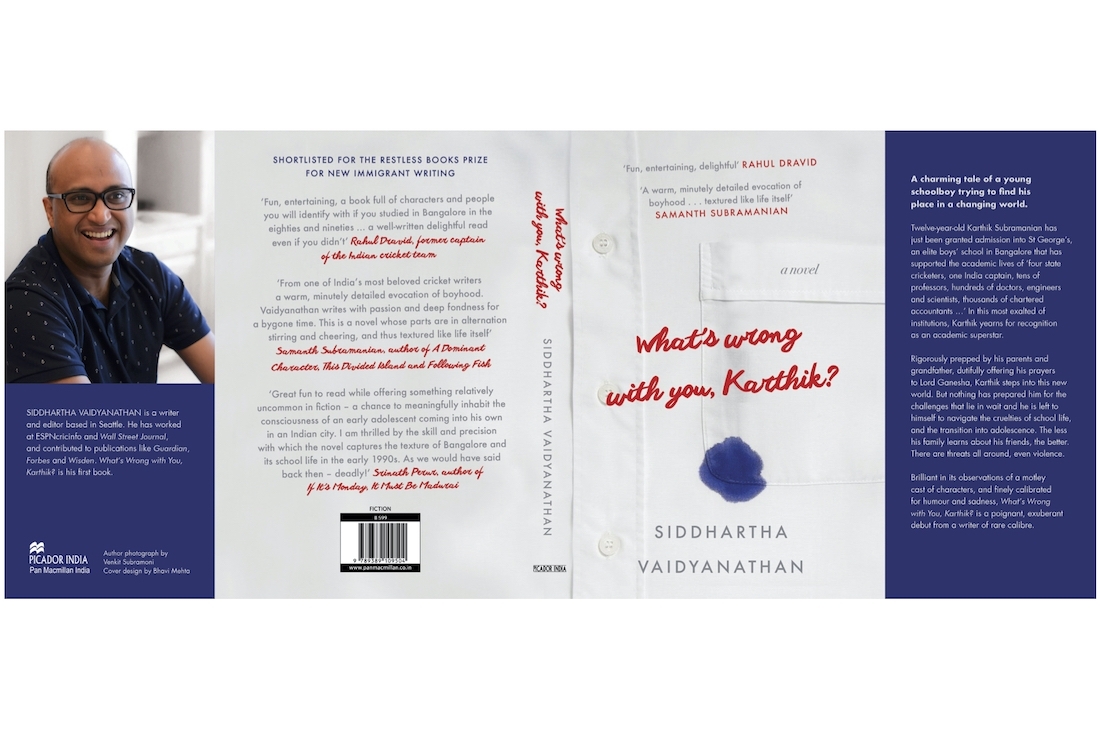

It takes a writer of rare calibre to write a book about a young child that is immediately relevant to an adult, both in terms of its plot and thematic concerns. Siddhartha Vaidyanathan’s debut book, What’s Wrong with You, Karthik?, is one such rare book. Shortlisted for the Restless Books Prize for New Immigrant Writing, the book tells a charming tale of a young schoolboy trying to find his place in a changing world. As twelve-year-old Karthik Subramanian navigates the cruelties of school life, the exuberance of the universal journey, from innocence to experience, is refreshing and captivating. The novel is at once hilarious, yet poignant. We connected with the author to know more about his journey and the book
The Author
I am a mechanical engineer turned cricket writer turned editor, and now also a novelist. I discovered the thrill of writing when I worked as a full-time cricket writer for ESPNcricinfo, from 2003 to 2008. My editors were happy for me to experiment with language and structure, and they encouraged me to write in-depth features and profiles. Most importantly – many of my colleagues were exceptional writers and were always generous with feedback.
I am drawn to short stories and short novels. The best writers know what to say and what to leave out. They create spaces where the readers’ imagination can kick in, and allow them to fill in the gaps with their own thoughts and recollections. This is a powerful way to engage with a book. It turns reading into a dance between the writer and the reader. The first builds the house, the second brings in the furniture.
R. K. Narayan is an inspiration. Swami and Friends was the first book I fell in love with. There is a part in the first chapter where the narrator says, ‘While the teacher was scrutinising the sums, Swaminathan was gazing on his face, which seemed so tame at close quarters.’ The book is full of such insights from a child’s vantage. I have delighted in reading it even as an adult. Other early favourites include Mark Twain, Ruskin Bond, VS Naipaul, Guy de Maupassant, George Orwell, Kuvempu.
The Book
Children fascinate me. I think the world will be a better place if we can pay more attention to what children tell us. I am also deeply interested in education and environments that foster learning. I was fortunate to spend six-years in alternative schooling, at a school founded by J. Krishnamurthi. We were granted the freedom to learn at our own pace and were not burdened with tests and exams. Even homework was fun. I moved from there to an elite school run by Jesuits. This place prepared us to crack exams and get into the best colleges. I understood the benefits and drawbacks of both styles. Fiction provided me a fertile ground to explore these themes.
The Process
It began with Karthik’s character. I was writing some short stories set in a school — and briefly thought of putting together a collection — when this boy came to me. From that point, I was obsessed with this 12-year-old. I liked the character so much that I didn’t want him to grow up too quickly. I decided to focus the book on one year of his life, and throw as many challenges at him as I could. Once I nailed down the book’s structure, it was a question of figuring out what to add and what to leave out. I didn’t want to overwhelm the reader with detail. I wanted to include just enough to fire up their imagination and urge them to continue reading.
The biggest challenge was to find a voice for Karthik. How does a 12-year-old boy view the world around him? What is he likely to observe in different settings? I had to find a way for him to be smart but not over-smart, charming but not childish. I stayed clear of big words and abstract thoughts. He had to be ferociously observant and yet not judgmental. He had to be outwardly shy but inwardly talkative.
To The Reader
I hope readers enjoy the time they spend in Karthik’s world and are tickled by his quirky observations. Adolescents are notoriously reserved when adults are present. Here is a chance to overhear their intimate conversations. The journalist and author Samanth Subramanian captured the essence of the book when he wrote: ‘… while the trials and tests of childhood may seem small in retrospect, they loom as large as mountains to the child facing them.’ This story lays out the roadblocks that many children face at a delicate stage, and allows us to empathise with their behaviour.
The Pandemic and beyond
I have been fortunate. My work has continued, and my family has been supportive through this testing phase. As someone who has worked from home for the last eight years, I am glad employers are seeing the benefits of this method. This pandemic has hopefully changed our perspectives of work and family. My hope is for a better sense of work-life balance in the future, and for us to value our dear ones much more. I have a couple of ideas but nothing concrete yet. I am still waiting for a character to grip me the way Karthik did.